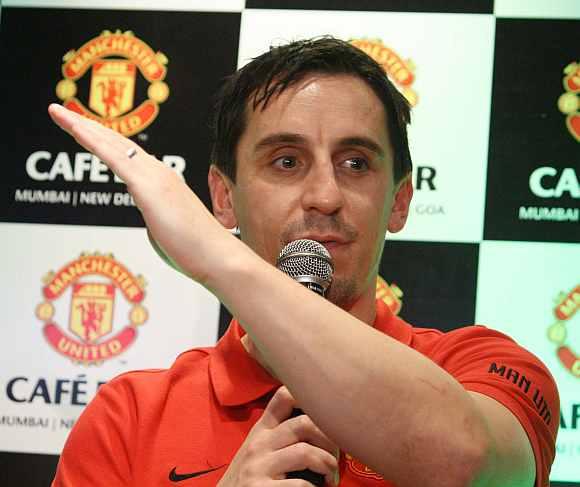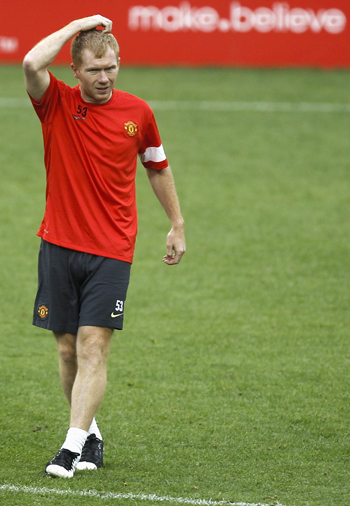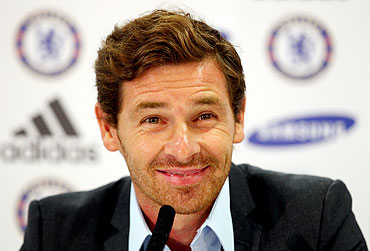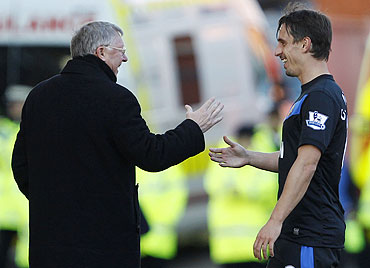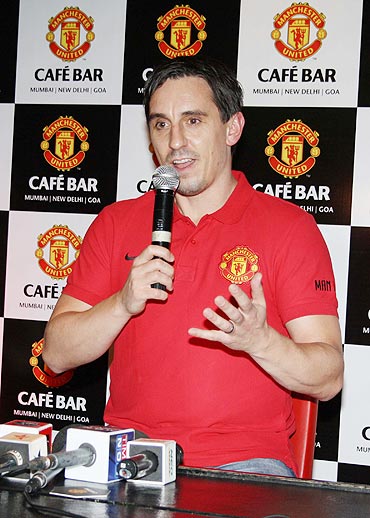 | « Back to article | Print this article |
'I have been lucky to witness the passion of the fans world over'
Former Manchester United ace Gary Neville reveals why he never quit the champion club, and shares his thoughts on manager Sir Alex Ferguson and the future of football in India.
In India, cricket is the only sport that draws fans in numbers. It is like a religion and cricketers are revered like demi gods. Thus, it was a big surprise to see over 300 fans turn up at the Manchester United cafe in Mumbai to meet and greet the famed English club's former captain, Gary Neville.
Dressed in Manchester United jerseys, mufflers and caps, they waited patiently for over two hours to get a glimpse of England's most-capped defender. No sooner did the fans enter the cafe than it was a chorus of "Gary Neville is a Red" till their favourite player made an appearance.
As the fans jostled with each other for a photograph or memorabilia autographed by him, Neville watched in awe, certainly overwhelmed by the reception he got.
A video, capturing highlights of his 19-year football career, was released on the occasion.
Neville, who spent his entire playing career at Old Trafford, hung up his boots last year, winning the Premier League eight times, FA Cup thrice and Champions League in 1998-99, among other awards.
Sonil Dedhia caught with up the 36-year-old, who revealed why he never quit Manchester United, his thoughts on manager Sir Alex Ferguson and the future of football in India.
This is your first visit to India. How do you feel representing Manchester United?
I have been with Manchester United for 20 years. The strength of the club has just kept growing every year. We have a wonderful stadium (Old Trafford) and we have a wonderful team and a wonderful manager; but most important are the people and the fans.
I have been very lucky to play with Manchester United, to witness the passion of the fans all over the world. This is my first time in India and I love the people and I am excited with the reception that I have got since the time I have come here. It's been a privilege to come here and experience the people and see their obsession.
The facilities out here to watch and enjoy football are just amazing. In fact, we do not have facilities back in Manchester to watch Manchester United play.
'Scholes should play football for two more years'
Recently, Paul Scholes came out of retirement and is now going to play again for Manchester United. Do you have any similar plans?
Some players retire at 25 or some retire at 32, but I decided to retire when I felt my career had come to an end. I could have continued playing, maybe with some other club and may be drop down, but I wanted to be with only one club and wanted to finish at the top with Manchester United.
Ryan Giggs is an exception. Right from the age of 17, up to the age of 37, and he has now turned 38, he is incredible and unique in the way he continues to play.
Paul Scholes retired six months ago and he regrets his decision and decided to come back. I don't regret my decision.
With Paul Scholes back out of retirement does it highlight that Manchester United is going through some problems in the midfield?
There are problems in the midfield. There were injuries to Paul Scholes and Owen Hargreaves, and so they left last summer. We have recently seen injuries to Tom Cleverly and Anderson and also Darren Fletcher has been out for a long time. Scholes is an individual case where he wanted to come back and play football irrespective of the problems Manchester United has.
For me, Scholes should play football for two more years; it is a big boost to the team at this time.
Manchester United generally are at the top of their game during Christmas. This season they seem to be a little sloppy and have lost unnecessary points in the league.
It is too early to predict that they have gone down after Christmas. There is a lot to play yet. There are four more months and I think the most crucial months are March, April and May. These are the months that matter.
In January you are baking your cake and waiting to eat it. I remember, we had been 10 points behind Arsenal in December in one of the seasons and we had gone on to win the title.
The next six weeks are really important, because we are playing the best of the teams. We are just three points behind in the Premier League and are a part of the FA Cup, so it's a long way to go.
'Villas-Boas has a huge responsibility ahead of him'
Sir Alex has always stayed away from spending during the January transfer window. What is the reason behind it?
People get fascinated with the January transfer window, but it has never been successful for Manchester United or any other club. Chelsea, last year, signed David Luiz and Fernando Torres for 75 million pounds. You pay inflated prices and the players can play only for four months since the season comes to an end by May, so it gets difficult for anyone to settle down.
I have never seen any side benefiting by buying players in January. So someone like Paul Scholes, who decides to come back to football, is beneficial because he knows the club.
On one hand we have Sir Alex Ferguson who is managing the team for 25 years and on the other hand we have a young manager in Andre Villas-Boas. While Ferguson has continued to rule, Villa-Boas has struggled in his first season. Is it difficult for a young manager to manage in the Premier League?
Jose Mourinho had never experienced English football before he was very successful, nor did Arsene Wenger, but he won the Championship in his second season. I think it is about an individual and not necessarily about experience. I am sure experience does help a lot, but new managers have been successful.
Chelsea's problem this year is not the manager, as he got a good reputation. I think they are going through a period of transition. They have some injury problems too. It is necessary to have a right mix of players in a team. Chelsea somewhere has still stuck to the same team of 2005. They haven't changed much. As I said earlier, Sir Alex keeps on changing the team in two-three years. Maybe Andre Villas-Boas is picking up the job but he has a huge responsibility in front of him.
'You cannot imagine life at Manchester United without Sir Alex'
Who do you think can take over as manager from Sir Alex Ferguson, once he decides to retire?
Honestly, you cannot plan for a replacement for Sir Alex Ferguson. I can never imagine him leaving. I can still see him at the touchline going crazy [laughs]). I don't see him finishing because, for me, has not changed in his mentality and his persona for the last five to ten years. He always says that till the time his health is good he will continue. In terms of who the next manager is going to be, I don't know.
Do you have a dream of being the manager of Manchester United?
I dreamed of playing for the club, but I have never dreamed of being manager of Manchester United. I want to continue to contribute to football and I am doing it in my own way.
Did Sir Alex Ferguson play a part in shaping your career?
He has been a huge influence. The average lifespan of a manager today in the Premier League is 10 months [smiles]. He is managing the same club for 25 years. You cannot imagine life at Manchester United without Sir Alex Ferguson. He has built so many teams and he always believes in young and talented players and gives them the platform, and the opportunity, and always assists them to achieve the best.
I think his key is that he ensures a new team keeps evolving every two-three years. He may be a tough taskmaster, but that is what you expect from your boss. He has given the club a big identity. He creates teams that are exciting and that is one of the reasons so many fans can connect to the club.
We sometimes take him for granted, but I feel the only time he will truly be recognised is when he decides to leave.
'I think 1999 also was very special'
You have been a one-man club and played for Manchester United for 19 years. Which was the best moment of your life at the club?
I think, for me, I first grew up as a fan of Manchester United. I first went to watch them play at the age of five and I just fell in love with the team, the jersey, the stadium and the atmosphere in the stadium made by the fans.
The biggest moment of my life was when I made my debut, because that was the start to everything for me. It made me believe that I could enjoy the experience and feel being part of Manchester United. I never dreamed that I would play for the club till 2011!
No one can predict the future, but I have had an incredible journey of 19 years. Every day was a good day for me. The manger is great, the atmosphere in the dressing room is amazing and being one of the core players along with the young and fresh talent is an incredible feeling.
I think 1999 also was very special, when in a span of 10 days we won the treble (Premier League, Champions League and The FA Cup), and I don't think those ten days can ever be repeated in my life.
Who do you think is the best player you have ever played with?
I played with Paul Scholes since I was 12. So it's been an association of 23 years. I have a special friend in Ryan Giggs. They both are very special. Paul Scholes is the best player I have ever played with.
What is the reason for England's dismal performance at the international level?
The biggest reason England don't succeed is that we are not good enough. Argentina, Germany, Brazil, Spain, France have been better in the last 15 years when I have played with England. We missed playing in the European competition in the 1980s, as we were banned because of the fans and during that time we lost almost 10 years to grow and develop new players.
The coaching has been different in Spain, France and Argentina is a lot better. They are technically a lot better. But now there is a new breed coming in England. Players like Danny Welbeck, Tom Cleverley, Jack Wilshere, Daniel Sturridge and so many others. In the next 10-15 years England can be more successful.
What do you have to say about Indian football? There are no players from India who have played in the Premier League...
It has to happen. Producing football players is all about getting the right facilities, infrastructure and good coaching. India needs to have a foundation, and the facilities are very important. Like England, there is no standardised coaching at the grass root level and that has to change.
Back home we are always questioned as to why England does not produce some good players, which is true. Young players in India need to watch what the best players are doing and try to play on good pitches. For India to produce players who play at the Premier League, I am sure it will happen in the next five to 10 years.
